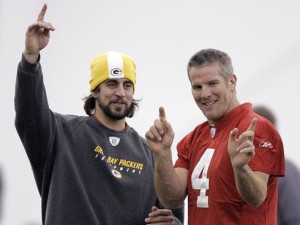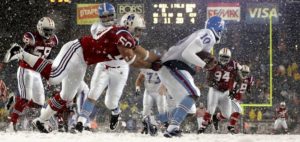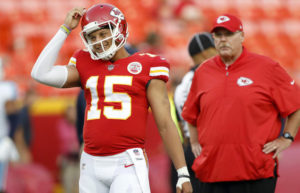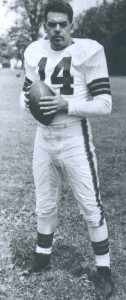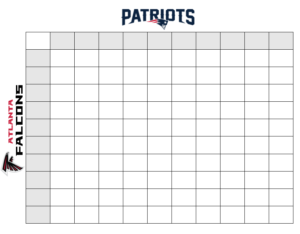Below are 31 questions, where the answer to each question is Steve Young, Aaron Rodgers, or tie. All stats are through 2018 and regular season only, unless expressly noted otherwise.
Post your score in the comments! The honor system will be strictly enforced.
1. Which quarterback won more games?
| Click 'Show' For Answer |
SelectShow |
Answer: Aaron Rodgers. Rodgers has won 100 games, while Young has won 94.
|
2. Which quarterback has a higher career winning percentage?
| Click 'Show' For Answer |
SelectShow |
Answer: Steve Young. Young has a 94-49 record, for a 0.657 winning percentage. Rodgers has won 100 games, while Young has won 94.
|
3. Which quarterback won the most Super Bowls as a starter?
| Click 'Show' For Answer |
SelectShow |
Answer: Tie. Both Young and Rodgers each won 1 Super Bowl, with Young winning in ’94 and Rodgers in ’10; both quarterbacks were the MVPs in those Super Bowls, too. Young, of course, also won Super Bowls with the 49ers in ’88 and ’89, as the team’s backup quarterback.
|
4. Which quarterback won the most AP MVP awards?
| Click 'Show' For Answer |
SelectShow |
Answer: Tie. Both Young and Rodgers each won 2 AP MVP Awards. Young was the AP MVP in ’92 and ’94, and Rodgers was the AP MVP in ’11 and ’14.
Neither quarterback won any of the other major MVP awards in any other season, either. Although Young does have an edge in AP Offensive Player of the Year Awards: he won the award in ’92, but lost it to Barry Sanders in ’94. Rodgers lost out on AP OPOY honors to Drew Brees in ’11 and DeMarco Murray in ’14. The less said about that, the better.
|
5. Which quarterback earned the most 1st-team All-Pro selections from the Associated Press?
| Click 'Show' For Answer |
SelectShow |
Answer: Steve Young. Young has 3 first-team All-Pro choices from the AP, winning in ’92, ’93, and ’94, while Rodgers has just the two (’11 and ’14). In 1993, Emmitt Smith (26 votes) narrowly edged Young (21) for the AP MVP Award.
|
6. Which quarterback made the most Pro Bowls?
| Click 'Show' For Answer |
SelectShow |
Answer: Tie. Rodgers and Young each made 7 Pro Bowls.
|
7. Which quarterback led the league in completion percentage most often?
| Click 'Show' For Answer |
SelectShow |
Answer: Steve Young. Young led the NFL in completion percentage a whopping 5 times, while Rodgers never has.
|
8. Which quarterback led the league in TD/INT ratio most often?
| Click 'Show' For Answer |
SelectShow |
Answer: Aaron Rodgers. Rodgers led the NFL in TD/INT ratio four times: 2011, 2012, 2014, and 2018. Young led the NFL in TD/INT ratio two times: 1992 and 1994.
|
9. Which quarterback led the league in passer rating most often?
| Click 'Show' For Answer |
SelectShow |
Answer: Steve Young. Young led the NFL in passer rating 6 times — each year from ’91 to ’97 other than ’95, while Rodgers “only” did it in ’11 and ’12.
|
10. Which quarterback led the league in ANY/A most often?
| Click 'Show' For Answer |
SelectShow |
Answer: Steve Young. Young led the NFL in ANY/A in ’92, ’93, ’94, and ’97, while Rodgers did it in “only” ’11 and ’14.
|
11. Which quarterback led the league in Passing Touchdowns most often?
| Click 'Show' For Answer |
SelectShow |
Answer: Steve Young. Young led the NFL in passing touchdowns 4 times (’92, ’93, ’94, and ’98), while Rodgers only did it one time (2016).
|
12. Which quarterback had fewer (i.e., a better amount of) fumbles?
| Click 'Show' For Answer |
SelectShow |
Answer: Steve Young. Rodgers fumbled 77 times, compared to 68 for Young.
|
13. Which quarterback had more rushing TDs?
| Click 'Show' For Answer |
SelectShow |
Answer: Steve Young. Young had 43, while Rodgers has 27.
|
14. Which quarterback had more rushing yards?
| Click 'Show' For Answer |
SelectShow |
Answer: Steve Young. Young had 4,239, while Rodgers has 2,939.
|
15. Which quarterback had more rushing yards per carry?
| Click 'Show' For Answer |
SelectShow |
Answer: Steve Young. Young averaged 5.9 yards per carry, while Rodgers has a 5.2 yards per carry average.
|
The next set of questions cover the statistics produced by each quarterback relative to the other passers of his era. For Young, this looks at the 32 quarterbacks with the most pass attempts from 1985 to 1999; for Rodgers, the sample size is the 32 quarterbacks with the most pass attempts from 2005 to 2018.
16. Which quarterback ranks higher in ANY/A?
17. Which quarterback ranks higher in passer rating?
18. Which quarterback ranks higher in TD percentage?
| Click 'Show' For Answer |
SelectShow |
Answer: Tie. Young is first at 5.6%, while Rodgers is first at 6.2%.
|
19. Which quarterback ranks better (i.e., lower) in INT percentage?
| Click 'Show' For Answer |
SelectShow |
Answer: Aaron Rodgers. Rodgers is first at 1.46%, while Young is third at 2.58%, a hair behind Montana (2.56) but well behind Neil O’Donnell (2.03%).
|
20. Which quarterback ranks higher in Yards/Attempt?
21. Which quarterback ranks higher in 4th Quarter Comebacks?
| Click 'Show' For Answer |
SelectShow |
Answer: Steve Young. This question, along with the next two, get to some of the rare stats where both quarterbacks don’t excel. Young is tied for 15th in 4QCs with 13. Rodgers is 20th in this category with just 14.
|
22. Which quarterback ranks higher in Game Winning Drives?
| Click 'Show' For Answer |
SelectShow |
Answer: Steve Young. Young is tied for 15th in Game-Winning Drives with 16. Rodgers is 16th in this category with 20.
|
23. Which quarterback had a better (i.e., lower) rank in sack rate?
| Click 'Show' For Answer |
SelectShow |
Answer: Steve Young. Young ranks just 23rd in this metric (or 10th-worst) of the 32 quarterbacks with the most pass attempts of his era with a sack rate of 7.9%. But Rodgers had the 28th-best (or 5th-worst) sack rate of these 32 quarterbacks, at 7.0%.
|
24. Which quarterback ranked better TD/INT ratio?
| Click 'Show' For Answer |
SelectShow |
Answer: Tie, of course. Both easily ranked 1st in this category. Rodgers is first at 4.23(!), with only Brady (3.53) and Wilson (3.11) above 3:1. Young was first at 2.17, with Montana (1.96) and O’Donnell (1.84) rounding out the top 3.
|
25. Which quarterback ranked better in Yards/Completion?
| Click 'Show' For Answer |
SelectShow |
Answer: Aaron Rodgers. We all know that Young is the completion percentage king, but the only reason their yards/attempt numbers are close is because of Rodgers’ strong yards/completion numbers. Rodgers ranks 7th, at 12.06, and not far behind the leader Cam Newton at 12.27. Young averaged 12.42 yards per completion in a different era: that ranks 10th, a mile behind leader Jay Schroeder (14.07) but also far behind runner-up Phil Simms (13.00).
|
Finally, let’s get to some playoff numbers. Which, like everything else here, isn’t easy.
26. Which quarterback won more playoff games?
| Click 'Show' For Answer |
SelectShow |
Answer: Aaron Rodgers. Rodgers won 9 playoff games, while Young won 8 playoff games.
|
27. Which quarterback had a better playoff winning percentage?
| Click 'Show' For Answer |
SelectShow |
Answer: Steve Young. Young went 8-6 (0.571), while Rodgers has a 9-7 record (0.563) .
|
The next set of questions look at the quarterbacks with the 15 most pass attempts from ’87 to ’98 (for Young) and ’07 to ’16 (for Rodgers) in playoff games:
28. Which quarterback ranks better in Yards/Attempt?
| Click 'Show' For Answer |
SelectShow |
Answer: Steve Young. But surprisingly, neither quarterback fares all that well here. Young ranks 8th at 7.06, while Rodgers is 9th at 7.49.
|
29. Which quarterback ranks better in Passer Rating?
| Click 'Show' For Answer |
SelectShow |
Answer: Tie. Young ranks 4th at 85.8, while Rodgers is 4th at 99.4 in the modern era.
|
30. Which quarterback ranks better in rushing yards in the playoffs?
| Click 'Show' For Answer |
SelectShow |
Answer: Steve Young. Young ranks 1st by a good amount with 594 and also ranks first in rushing touchdowns with 8. Rodgers is 3rd in both rushing yards and rushing touchdowns at 274 and 3.
|
31. Which quarterback ranks better in playoff ANY/A?
How did you do?


